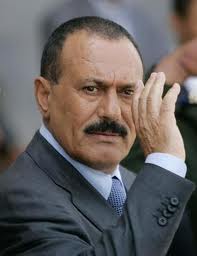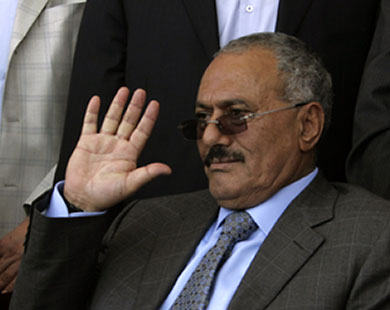Yemeni Saleh signs power transfer deal.
 Yemen's Ali Abdullah Saleh, who on Wednesday resigned as president after almost 10 months of bloody protests calling for him to quit, has ruled through three decades of Middle East turmoil.
Yemen's Ali Abdullah Saleh, who on Wednesday resigned as president after almost 10 months of bloody protests calling for him to quit, has ruled through three decades of Middle East turmoil.
Saleh has lived through civil war, rebellion in the north, an Al-Qaeda insurgency in the south and a bomb attack on his palace in June that badly wounded him, only returning home after three months of treatment in Saudi Arabia.
Ali Abdullah Saleh arrived in Saudi Arabia to sign a power transfer deal under which he retains the title of President until elections in January and enjoys immunity from prosecution.
The development caused new protests and clashes in Yemen, where the people demand the unpopular president's trial.
In April, the opposition signed a Gulf Cooperation Council-sponsored transition deal but Saleh repeatedly stalled, triggering months of political deadlock that has left the government in a state of chaos and the economy in shambles.
The deal will see him leave office in 30 days, making way for Vice President Abdrabuh Mansur Hadi to negotiate a power transfer with the opposition in return for a promise of immunity from prosecution.
Saleh will now seek medical treatment in New York, UN leader Ban Ki-moon said on Wednesday.
A US diplomatic cable in 2009 released by whistle blower website WikiLeaks spoke of a leader who had grown increasingly autocratic.
 It quoted Saleh's cousin Mohammed al-Qadhi as saying that "since 1994, he decided that he was the only man capable of making decisions in this country."
It quoted Saleh's cousin Mohammed al-Qadhi as saying that "since 1994, he decided that he was the only man capable of making decisions in this country."
Saleh, a 69-year-old man, joined the army at an early age. His leadership skills were noticed and he climbed the ladder of power in short order.
Following the June 1978 assassination of president Ahmad al-Ghashmi, Saleh was elected president of North Yemen by a constituent assembly.
He immediately surrounded himself with close aides, notably his brothers, whom he named to key military and security posts.
His son Ahmed commands the Republic Guard, which has been engaged in fierce fighting with opposition forces backed by dissident tribal chief Sheikh Sadiq al-Ahmar.
In 1990, he successfully steered the country to reunification with the communist south.
Following Yemen's unification, Saleh launched a cautious process of reform, introducing a multi-party system.
He also gave the press a margin of freedom, but in the mainly illiterate society his tight grip on the state broadcast media long allowed him to keep control of Yemenis' access to information.
He organized parliamentary elections in 1993, 1997 and 2003.
Saleh won his last seven-year term in September 2006 with 77 percent of the vote, once more outliving his own experiment in democratization amid widespread charges of fraud.
